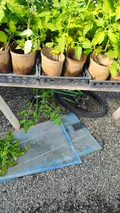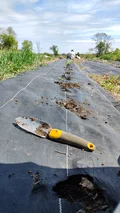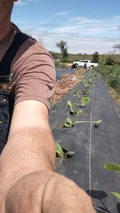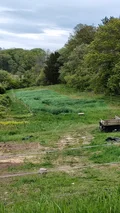TL;DR
It was a small crew today, just three of us. We cultivated then planted zuchini and summer squash; then we processed eggs. This gave me a lot of time to think. The following is a list of the things I was involved in:
- watering and feeding the chickens, picking up eggs
- watering and feeding the pigs, checking the electric fence
- cultivating soil holes in landscaping fabric
- planting zuchini and summer squash (delicate seedlings)
- hoeing the lower field around lettuces
- processing eggs (washing, sorting, labeling)
- cleaning the greenhouse and consolidating trays
- planting peppers
A Lot of Time to Think
While working, we often talk to each other…play word games or tell stories. I try to think about what’s coming up and what to anticipate in activities on the farm, to exercise the knowledge I’ve learned and stretch my intuitions then verify them later. In between all this, I also have time to think.
I think that agriculture is in a period of transition. There are demands and pressures without proper supporting systems behind them. There’s a lack of consumer competence and interest in what really makes for high quality agriculture product vs. convenience and price. There’s an extreme deficit in the number of farmers and the number of people who are willing to work on farms. There are still new farmers coming into the industry and a lot of old farmers leaving.
There is a lot of work to be done.
Misconceptions in Organic Farming
There are misconceptions that organic farming is easy, that it’s a hobby, that it’s a lifestyle. There are misconceptions that farming is way to hard. There are misconceptions that technology has no place in natural and traditional farming, though in every century of farming, there has been ‘technology’.
The grain silo (or at least consolidating it into a space that it doesn’t rot) is a technology. The hoe is technology…every tool is. The tractor is a technology. Greenhouses are technology. Irrigation systems are technology. The repeatable and profitable process of seed saving (such as Johnny’s Selected Seeds) to sell them to organic farmers is technology.
It’s not just bookeeping and CSA member emails and social media that is the technology of farming…so the next time someone suggests that organic farming and technology are juxtaposed to each other, maybe they’re just not thinking about it creatively.
The Value of Keeping Organic Farming Low-Tech
Often the way technology influences things is by making them more efficient or affordable. This leads to their value being measured usually only in speed and cost, similar to much of the world of business. It rarely is measured in the importance of safety, physical or psychological, or how it achieves other goals.
So too when people apply technology to agriculture, they often overlook the value of keeping it low-tech. The farm I’m on has a tractor that was made in 1953 which rarely breaks down. It’s not big and can’t do the job of a huge tractor, but it does the job it needs to: sitting in the fields that need cultivation and basket weeding from time to time. It’s low fuss, low variability, low overhead.
There are hundreds of things that need to be looked after in a farm season, if not thousands. Farmers are constantly mentally reprioritizing based on time and timing, what needs to happen when. There is no computer that can do this yet. In organic farming, the point is that computers never should be in charge of natural systems. The computer is a tool, not a replacement for human decision process.
Improving the Farm
It’s not my place to suggest improvements, not what I am paid for. I am in learning mode and show up on time and work as hard as I can. I don’t have enough experience or intuition to feel comfortable suggestiong things, but I have 20 years of working with gardens so I’m not a complete novice in soil. I listen to many books about soil science and organic farming. I research things that come up in the day…I don’t just do stuff and forget about it.
At some point, I’ll have enough experience to make suggestions, but I’m not there yet. I think there are at least a dozen places where many small farms would significantly benefit from just the right amount of technology and small financial investments.
For now, my lack of investment in fixing my LLM with more context this past weekend results in the same kind of output you’d expect from a 19 year old jr. office assistant:
Part 1
Main Themes:
- Farming practices and techniques
- Soil conservation and management
- Crop care and maintenance
- Experimentation and innovation in farming methods
Activities done by the intern:
- Watered the greenhouse in the morning
- Assisted with chores until 9:30 AM
- Planted two rows of eggplants, including cultivating the ground
- Weeded persistent grasses and a running vine through the field
- Cleaned out holes to prepare for planting
New things not yet encountered by the intern:
- Landscaping fabric system
- ProGro 534 fertilizer
- Compaction of soil due to tilling
Questions and future areas of research:
- How to reduce compaction of soil in fields
- Methods for amending soil with carbon-rich materials (e.g., compost, straw)
- Effects of planting sweet potatoes directly in hay on root systems
- Comparison of root systems between same row, same level, same everything else
Suggested actions:
- Conduct further research on methods to reduce compaction of soil
- Experiment with amending soil with compost or other carbon-rich materials
- Consider planting sweet potatoes directly in hay and monitoring its effects on root systems
- Discuss and plan for future planting experiments, including the possibility of mixing straw with the dirt
Part 2
Main Themes:
- Farm work and daily tasks
- Research and experimentation (limited to small-scale)
- Harvesting and processing eggs
- Managing farm operations and logistics
- Weather conditions and their impact on farm activities
Activities done by the intern:
- Fixed holes in landscaping fabric with straw or compost
- Loaded truck with peppers
- Fixed additional landscaping fabric for eggplant planting
- Planted short row of peppers after lunch
- Washed and processed 60 dozen eggs (approximately 3.30 hours)
- Labeled green buckets/bins with week numbers for CSA
- Found four more trays of peppers for the final row
- Ran back to barn to set traps and drop off garbage/recycling bins
New things not yet encountered:
- Amending landscaping fabric with slightly loamy material to loosen soil
- Processing 60 dozen eggs in a short time frame (approximately 3.30 hours)
- Specific challenges with egg carton closure due to large egg sizes
Questions and future areas of research:
- How effective is amending landscaping fabric with loamy material?
- How does this method impact plant establishment and growth?
Suggestion actions:
- Consider conducting a larger-scale experiment on amending landscaping fabric for more data.
- Continue to monitor egg production and processing times to optimize efficiency.
- Investigate ways to improve egg carton closure due to large egg sizes.
[end of post]
Enjoy Reading This Article?
Here are some more articles you might like to read next:










